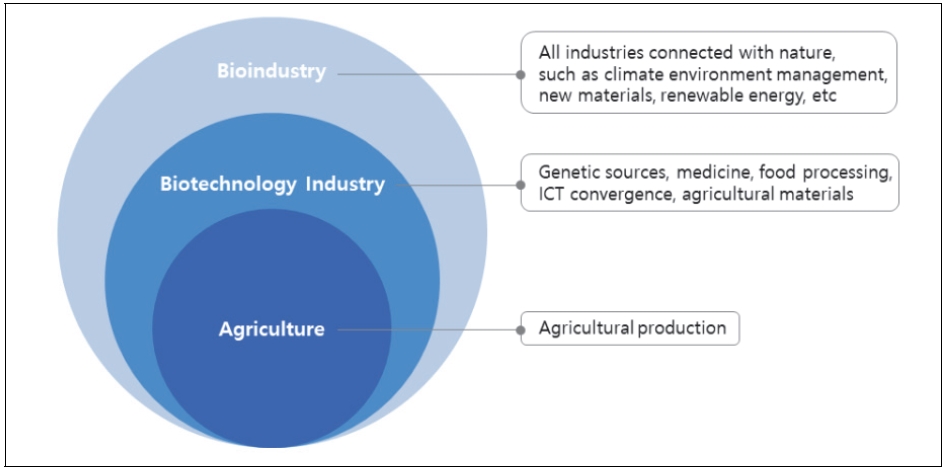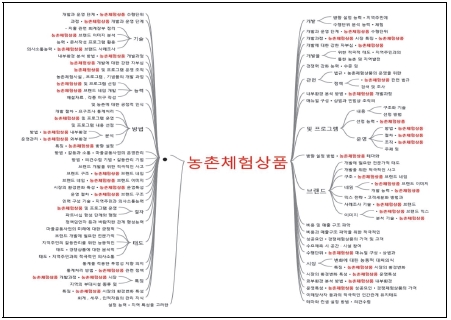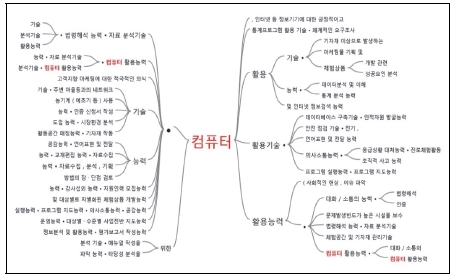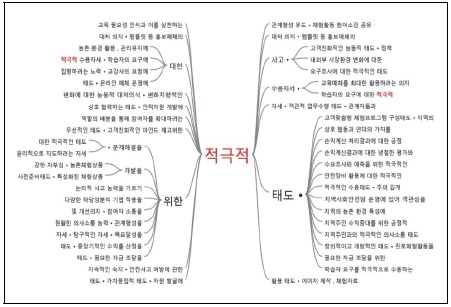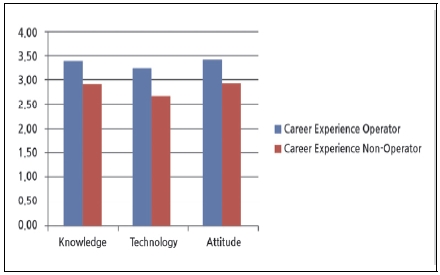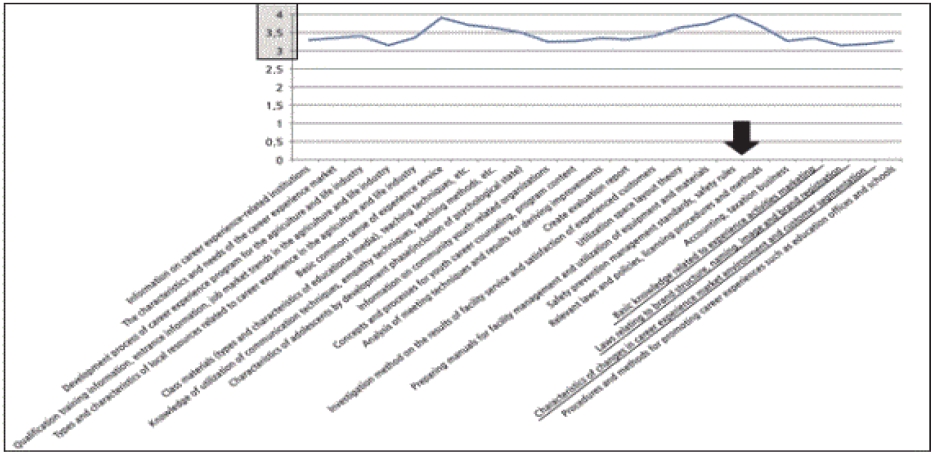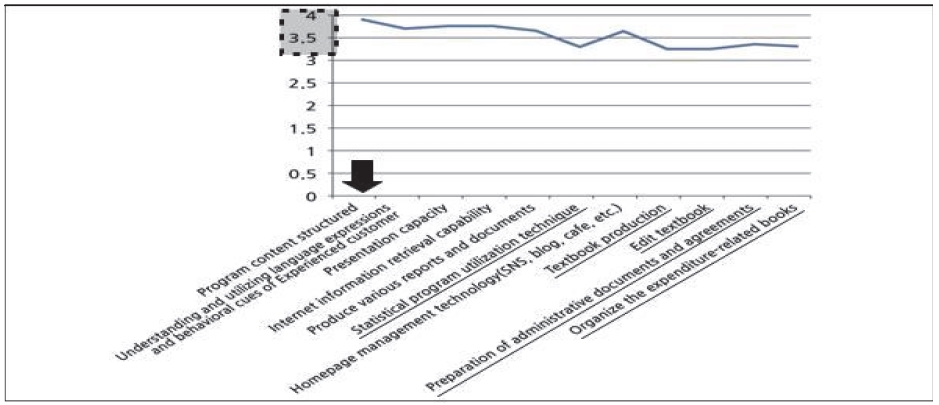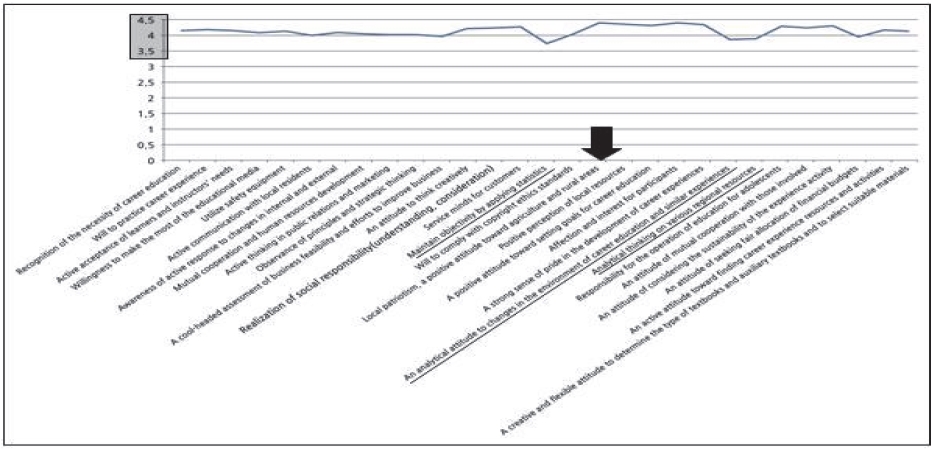
농생명산업 진로체험처로서 농촌교육농장 실태분석 : 농촌교육농장주 진로체험 역량을 중심으로
This is an Open-Access article distributed under the terms of the Creative Commons Attribution Non-Commercial License (http://creativecommons.org/licenses/by-nc/3.0) which permits unrestricted non-commercial use, distribution, and reproduction in any medium, provided the original work is properly cited.
Abstract
This study attempted to diagnose the status of rural education farms which act as agricultural life industry career experience centers for young people in rural areas and to formulate action plans for their development. First, the major issues of competency required for career experience in the agricultural life industry were divided into “rural experience products”, “computers” and “active”. Each of these performance criteria was classified into a knowledge domain (23 competencies), a technology domain (11 competencies), and an attitude domain (29 competencies). Next, the results of a comparative analysis of the operation status of general experience and career experience in rural education farms showed that 77% of the survey subjects had some operating career experience. As for career management experience, 69.1% of them had less than 5 years of experience. A review of the number of annual visitors revealed that 62.4% of the farms had less than 500 people seeking career experience, and 63.6% had 501-5,000 people for general experience, showing a significant difference in the scale of operation. The implications for the development of agricultural life industry career experience based on the rural education farms are : 1) It is necessary to acquire new knowledge that responds to changes 2) It is necessary to technically prepare a teaching method suitable for the youth namely middle and high school students, that is, youth 3) A systematic basis should be prepared for actively utilizing the knowledge base that rural education farms have built up through experiential activities. This study served as an opportunity to confirm the positive potential of rural education farms as a place for field study and career experience in the agricultural life industry for young people in rural areas. Ultimately, this could be meaningful as a basis for preparing policies and systems linking agriculture and education to the future generations' career exploration and advancement in the agricultural life industry, which currently lacks innovative talent.
Keywords:
agriculture career experience, education farm, current status, policy suggestionⅠ. 서론
최근 들어 기후변화에 따른 환경보전과 안전한 먹거리에 대한 관심이 높아지면서 자연의 선순환 체계를 유지하며 지속가능한 식량공급에 기여하는 농업분야 인식이 변화하고 있다. 특히, 코로나19 이후 도시민의 농업ㆍ농촌에 대한 인식 조사에 따르면, 국민경제에서 농업이 차지하는 중요성이 ‘높아졌다’(67.6%)고 응답한 비중이 ‘변화없다’(23.8%)나 ‘덜 중요해졌다’(1.4%)는 응답보다 높게 나타나(KREI, 2020) 인식변화 현상을 뒷받침하고 있다. 이러한 사회적 인식의 변화는 진로문제에 직면한 청소년들에게 인류의 생존과 맞닿은 환경보전과 식량안보에 기여하는 농생명산업을 유망한 진로분야로 재조명할 수 있을 것이다.
한편, 농촌교육농장은 농촌지역에서 농업과 교육, 농촌과 학교를 연결하는 교육모델로서, 농업활동이 이루어지는 농촌의 모든 자원을 바탕으로 하여 학교교육과 연계된 교육프로그램 전반에 걸친 활동을 정기적으로 제공하는 교육의 장(Korean Edufarm Association 2021)이며, 일회성 활동을 제공하는 체험농장과 구별된다. 즉, 농촌교육농장은 농생명산업에 대한 인식의 전환기에 청소년에게 그에 대한 진로탐색의 기회를 제공할 수 있는 최적의 체험처이며, 농업분야와 교육분야 모두에게 각광받는 농촌지역 교육자원이라 할 수 있겠다.
또, 초ㆍ중ㆍ고교생 사교육비 조사에 따르면 진로ㆍ진학 학습상담 사교육 참여율이 전년 대비 0.1%p 증가한 2.4%로 청소년의 진로관심은 증가하는 추세에 있다(Ministry of Education 2020). 2020년부터 자유학년제가 전국적으로 시행되면서 진로교육과 자유학년제 활동이 맞물려 학교 현장에서도 진로탐색 관련 캠프, 현장체험 등의 활동이 가장 활발하게 이루어지고 있다. 이렇듯 청소년의 진로탐색이 활발해지면서 그들의 터전인 지역사회에서부터 다양한 진로체험 활동이 이루어져야 한다는 논의도 지속적으로 제기되고 있다. Sung & Jung(2013)는 지역사회 참여의 중요성에 대한 공감대 형성과 청소년 진로체험기관의 발굴ㆍ섭외ㆍ연결, 진로체험활동의 질적 강화가 중요하다고 하였고, Ha(2015)는 자유학기제 진로체험활동 성공을 위해서는 지역사회 주체 간 연계가 관건이라고 하였다.
이상의 내용을 종합할 때, 기술과 환경이 급변하는 가운데 농업에 대한 인식의 전환기에 청소년을 대상으로 농생명산업 진로탐색의 기회를 제공할 수 있는 우수한 지역사회의 주체는 농촌교육농장이 가장 적합하다 하겠다. 그러나, 현재 농촌교육농장에서 운영 중인 진로체험은 도입기로서 기존의 현장체험학습과 차별성을 갖지 못하여 청소년의 진로교육에 대응하는 직업탐색에는 한계가 있는 것이 사실이다. 직업체험의 만족도는 취업목표 인식도 및 취업준비행동에 긍정적 영향을 주므로(Lee & Jang 2015), 우수한 농촌지역 진로교육자원인 농촌교육농장의 진로체험 질적 수준은 미래 농업인재 유입에 영향을 미칠 수 있고, 농생명산업의 혁신에도 기여할 수 있을 것이다. 농촌교육농장 진로체험의 질적 수준 향상을 위해 현재 운영 중인 진로체험 현황을 파악하고, 농장주들에게 요구되는 필요역량을 체계적으로 분석함으로써 구체적이고, 실천적인 대안 마련을 하는 연구가 필요하겠다.
따라서, 본 연구에서는 농촌교육농장이 농촌지역 청소년들의 농생명산업 진로체험처로서 유익한 프로그램을 제공할 수 있는지를 살펴보기 위해 진로체험의 운영현황과 농촌교육농장주들이 갖추고 있는 필요역량의 수준을 파악해 보고, 농생명산업 진로체험의 발전방안을 마련하고자 한다. 이를 통해 궁극적으로 농촌교육농장을 중심으로 한 농생명산업 진로체험을 활성화 하고, 청소년들의 농생명산업 진로인식을 개선하는데 기여하고자 한다.
Ⅱ. 이론적 배경
1. 농생명산업과 진로체험
4차산업혁명의 시대에 농업은 본연의 1차 농산물 생산을 기반으로 농생명산업으로서 기술 및 산업이 융합된 첨단산업분야로 도약하고 있고(Bu & Chae 2018), 기후환경관리, 신소재 등의 기술을 통해 탄소중립과 우주시대를 대비하는 미래지향적 분야로서 다양한 유망직업이 창출될 수 있는 산업이라 할 수 있다(Fig. 1).
이렇듯 농업이 첨단기술을 동반한 인류의 생존과 맞닿은 핵심적 분야(Cals at SNU 2021)임에도 불구하고, 농생명산업이 펼쳐지는 농촌은 전국 227개 지자체 중 79개소(34.6%)가 소멸위험지역에 속해있고, 농가인구 중 60세 이상이 88.9%로 농업종사자는 심각한 고령화에 처해있으며, 농업ㆍ농촌의 지속가능성은 위협받고 있다.
한편, 어린이에서 청소년으로 성장하는 중학생들에게 개인의 진로는 자신이 미래사회에 적응해 나아갈 방향을 말하며(Kim & Kim 2016), 학교를 비롯한 진로체험처는 학생들에게 체계적으로 미래에 대한 비전을 심어주는 기능을 수행하게 된다. 2015년에 제정된 「진로교육법」 제12조에 따르면 각급 학교에서는 학생들에게 다양한 진로체험의 기회를 제공할 수 있도록 교육과정을 편성하고, 운영하여야 한다. 구체적으로는 교과 및 창의체험활동과 연계한 진로교육을 강화하고, 진로교육ㆍ집중학년 학기제를 운영하거나 학교별 특색있는 진로교육사업을 운영하도록 하여 진로수업의 확대와 내실화를 도모하고 있다(Ministry of Education 2020).
농업ㆍ농촌에 대한 이해와 인식은 다른 경험보다 실제 목적을 갖는 체험을 통해 향상될 수 있다(Bu & Chae 2018). 가령, 농촌에서 태어나고 자란 학생들은 도시의 학생들보다 농업과 농촌에 대한 경험의 폭이 넓고 깊을 수 있지만 그것이 농업ㆍ농촌의 공익적 기능에 대한 이해로 직결되지는 않는다(Kim et al. 2004). 그러나 교육활동으로서 농업ㆍ농촌체험활동을 경험한 학생들은 미경험의 학생보다 이에 대한 이해도가 높고 농업ㆍ농촌에 대해서도 긍정적으로 인식한다는 것이다(Choi 2013). 즉, 학생들의 농업 및 농생명산업에 대한 이해와 인식은 교육활동, 특히 체험활동을 통해 향상되고 전환될 수 있으므로, 농생명산업 관련 진로탐색을 위한 체험활동이 교육의 일환으로서 매우 중요하다 하겠다.
2. 자유학년제 실시에 따른 농촌교육농장의 변화
자유학년제는 기본교과를 바탕으로 한 융합수업으로 대표되는 공통과정과 진로탐색활동, 동아리활동, 예술ㆍ체육활동, 선택프로그램활동으로 구성된 자율과정으로 이 중 전자에 대해서는 활동중심의 수업, 참여중심의 수업을 가능케 하였고(Kim 2015), 학습자의 자기주도 학습능력 중 자아개념, 자율성에 긍정적인 영향을 주는 한편, 학생의 인성이나 행복에도 긍정적인 영향을 주고 있다(Lee & Jin 2016). 뿐만 아니라, 자유학년제를 통해 교육주체인 교사, 학생과 학부모의 인식과 행동, 태도에도 많은 변화를 가져왔다(Kim & Kim 2016).
한편, 전세계적으로는 학생들의 다양한 활동영역에 대해 농업ㆍ농촌의 생태, 환경, 식생활 및 공동체문화 등을 교육적으로 활용하여 농업ㆍ농촌의 공익적 가치를 확산시키고 있다. 특히, 유럽 국가들은 농업ㆍ농촌의 대국민적 이해 증진을 위한 사회적 요구에 대응하여 교육부가 직접 교육농장 정책사업을 실시하는데, 프랑스는 40여년 동안 지속적으로 운영되면서 가장 체계적인 시스템을 갖추어 교육농장수가 1990년대 500여개, 2000년대에는 1,300여개로 증가하였다. 특히, 1992년에 부처 간 위원회(교육부, 법무부, 농업무, 환경부, 국토부, 체육청소년부)를 구성하여 교육농장 활동의 개념과 정책적 목표를 수립하였으며, 질적 발전을 위한 제도적 지원책을 마련하여 교육농장 프로그램 개발 및 운영과 관련된 자료를 개발ㆍ보급하고 있다.
영국의 FACE(Farming and Countryside Education) (Ibbetson-Price 2016), 미국의 Farm to School(Joshi et al. 2008), 그리고 교육적 기능을 농촌관광과 접목시킨 한국의 농촌교육농장(Park & Lee 2015)과 일본의 교육낙농장(Educational Dairy Farms)은 농업과 농촌이 갖는 교육적 기능과 그 효과를 극대화 하기 위해 시행되고 있는 프로그램이자 교육장(敎育場)으로서 여러 나라에서 농업과 농촌의 교육적 가치에 주목하고 있음을 시사하고 있다. 이 중 FACE와 Farm to School의 경우 국가적 차원에서 지원되는 교육프로그램이기 때문에 학교(영국의 KS1∼KS4, 미국의 K12에 해당)와 지역 농가가 긴밀하게 연결되어 있고, 지역 농산물이 학교급식 재료로 쓰이는 것에서부터 팜투어, 작물의 재배와 수확활동에 이르기까지 일련의 프로그램이 폭넓게 운영되며, 청소년 비만의 예방책이자 해결책으로도 주목받고 있기도 하다(Joshi et al. 2008; Ibbetson-Price 2016).
3. 교육농장 관련 선행연구
우리나라 교육농장은 농촌진흥청에서 2006년부터 농촌교육농장사업을 통해 공식적으로 운영되기 시작하였고, 현재 지자체사업을 포함하여 전국에 약 1,000여 개소(‘06~’12년 농촌진흥청 시범사업 621개소 포함)의 교육농장이 운영되고 있다. 그리고, 2015년부터는 품질인증제를 도입하여 체험학습의 질적 관리를 실시하고 있다.
이러한 교육농장 시스템의 도입·경영과 맥을 같이 하여 관련 연구도 1980년대에 Lee & Uzzell(1980)이 개방형 농장의 교육적 가치를 구명하는 등 교육적 효과(Na et al. 2000; Joshi et al. 2008)를 밝히고자 하는 연구가 활발히 이루어졌고, 농촌교육농장의 발전적 기틀을 마련할 수 있는 국내외 사례 및 운영실태(Park 2002; Kim & Jang 2014; Kim 2020), 선호체험(Park & Yoon 2009; Jolly & Krough 2010)에 대한 연구들이 추진되었다.
한편, Ahn & Youn(2017)의 연구에서도 지적하였듯 우리나라에서는 농촌교육농장이 ‘관광농원’의 대안으로 자리매김을 하면서 관련 연구도 관광학 또는 경영학적 접근의 연구가 대부분 이루어져서 방문객 만족도(Yang & Seo 2019; Kwak et al. 2016)와 품질관리(Ryu et al. 2019) 연구들이 추진되었다.
앞서 밝혔듯, 4차산업혁명과 융합한 농업의 밝은 비젼에 대하여 교육적 관심이 증가하면서 농촌교육농도 재조명되어 농촌교육농장의 구체적인 교육활동과 학습효과에 대한 고민과 진화를 논하는 움직임이 나타나고 있다(Ahn & Youn 2017; Bu & Chae 2018). 최근에 학교는 개인의 미래와 꿈이 현실과 부딪히는 장소로서 개인의 진로를 책임지고 바르게 이끌어 나갈 책무(Kim & Kim 2016)가 있다는 교육계의 입장과 맞물려 농촌교육농장도 진로체험을 통한 농촌교육농장의 교육서비스 전환의 계기가 필요하며, 이를 위한 실천방안 마련의 연구들이 필요하다고 사료된다.
Ⅲ. 연구방법
본 연구는 크게 두 부분으로 나누어 구성되어 있다. 첫째, 농생명산업 진로체험을 직접 운영하는 농장주들이 갖추어야 할 역량을 도출하는 것이고, 둘째, 도출한 역량과 교육농장의 진로체험 운영현황에 대한 설문을 구성하여 교육농장주를 대상으로 조사를 실시함으로서 농장주들의 필요역량 수준과 운영 현주소를 파악하는 것이다(Fig. 2).
1. 농장주 필요역량 질적 분석
농생명산업 진로체험을 추진하고자 하는 농장주의 역량을 파악하기 위해서 국가직무능력표준(National Competency Standards: NCS)에 등재되어 있는 직무 중 관련이 있거나 유사한 직무를 추출하였고, 각 직무별 능력단위와 수행준거(지식, 능력, 태도)의 상세내용을 분석하여 농생명산업 진로체험 농장주가 갖추어야 할 기본역량을 도출하였다.
농생명산업 진로체험 운영과 관련하여 국가직무능력표준(NCS)에 존재하는 직무는 7개이고, 각 직무별 능력단위와 수행준거(지식, 능력, 태도)의 상세내용을 질적 분석 방법을 통해 체계화 하여 항목을 도출하였다. 자료분석은 Kim & Kim(2008)의 연구에서 수행한 질적 자료분석 절차에 준하여 이루어졌고, 자료분석의 신뢰성을 높일 수 있도록 소프트웨어 Nvivo 12를 활용하였다. 본 연구에서는 텍스트화 된 NCS 기반 직무자료의 데이터 탐색을 위해 Nvivo를 활용하여 단어빈도 파악을 위한 키워드분석을 실시하고, 텍스트 검색을 통한 트리맵 분석을 하였다. 또한, 트리맵 분석을 통해 정리된 기본틀을 참고하여 개별 코딩함으로써 각 수행준거별 필요역량의 범주를 형성하고, 범주화된 내용과 관련하여 하위 역량을 재정리하였다.
한편, 코딩방법은 Strauss & Corbin(1998)의 이론을 바탕으로 상향식 개방형 코딩방법을 적용하였고, 직무분석 자료로부터 직접 특정 키워드별로 범주화하고, 그것에 의미를 함축한 코드를 생성하였다. 특히, 이러한 과정에서 코딩한 항목 간에 코딩빈도를 비교함으로써 어떤 항목이 진로체험을 운영하는데 큰 의미가 있는지 검증하며 분석을 진행하였다.
2. 설문의 구성
본 연구에서 농장주의 필요역량은 농장주가 자신의 업무 수행능력을 주관적으로 평가하는 척도로써 농생명산업 진로체험의 효율적 운영에 영향을 미치는 핵심 변인으로 정의하였다. 필요역량의 문항은 NCS에 존재하는 관련 직무를 질적으로 분석한 결과를 바탕으로 수행준거인 지식, 기술, 태도로 구분하여 개발하였다. 먼저, 지식은 체험상품으로서 진로체험 개발(7항목), 청소년 진로교육을 위한 지도방법(4항목), 체험활동 분석·평가(3항목), 체험농장 시설물 관리·운영(5항목), 진로체험 마케팅(4항목)으로 총 23개 항목을 추출하였다. 다음으로 기술은 의사소통 기술(3항목), 컴퓨터 및 소프트웨어 활용기술(4항목), 교수매체 활용 기술(2항목), 관리문서 작성 기술(2항목)으로 총 11항목을 추출하였다. 끝으로 태도는 적극적 사고 및 수용 자세(9항목), 사업가적 마인드(7항목), 긍정적 태도(5항목), 분석적 사고 및 태도(2항목), 책임감 있는 태도(4항목), 융통성 있는 태도(2항목)으로 총 29개 항목을 추출하였다. 즉, 농생명산업 진로체험을 운영하는 농장주의 필요역량은 총 63개 항목의 리커트 척도로 측정하였다(Table 1).

Questionnaire Items regarding the required competency of education farmers for agricultural life industry career experience
운영현황은 일반체험 운영현황과 진로체험 운영현황으로 구분하여 문항을 개발하였다. 먼저, 일반체험은 운영경력, 운영인력, 체험 수용가능 인원, 프로그램 개발 방법, 체험활동 유형, 연간 체험객 수, 진로체험 운영경험의 7개 항목을 추출하였다. 진로체험은 운영경력, 연간 운영횟수, 연간 진로체험객 수, 프로그램 개발 방법, 진로체험 직업분야의 5개 항목을 추출하였다.
한편, 교육농장의 진로체험 운영에 대한 의식 조사를 위해 진로체험 전환 의사를 묻는 문항으로 진로체험 도입의사 없음, 병행, 전문 진로체험 농장으로 전환의 3개 항목을 추출하고, 5점 리커트 척도(1.전혀 그렇지 않다, 2.그렇지 않다, 3.보통이다, 4.그렇다, 5. 매우 그렇다)로 구성하였다.
설문의 완성도를 높이고 효과적인 연구를 위해 추출된 항목으로 구성된 설문지에 대해서는 다수의 연구원이 적합성을 검토하였다. 설문지 구성요소는 Table 2에 정리하였다.
3. 자료수집 및 분석방법
본 연구를 위한 조사는 농촌교육농장협회원에 대하여 전국적으로 균등하게 분배하여 각도별 약 20여명의 교육농장주를 대상으로 2019년 8월부터 11월까지 이뤄졌다.
원활한 설문을 위해서 각 도별 대표를 조사원으로 지정하여 조사목적을 충분히 설명한 후 자기기입식 조사방법으로 실시하였다. 총 설문지는 각 도별 25부씩 총 225부를 배포하였고, 이 중 210부가 회수되었다. 본 설문조사의 회수율은 93.3%이다. 불성실한 응답지 1부를 제외하고, 결과적으로 209부를 실증분석에 활용하였다.
통계프로그램 SPSS21로 분석하였고, 분석방법은 1) 수집된 자료의 표본자료가 안정성을 가지며 적합한지를 확인하고, 표본의 일반적 특성을 파악하기 위해 기술통계분석과 빈도분석을 실시하였다. 2) 복수응답에 대한 빈도를 알아보기 위해 다중응답분석을 실시하였다. 3) 진로체험 운영집단과 비운영집단의 역량차이 비교를 위해 K-평균 군집분석을 실시하고, 차이를 검증하기 위해 독립표본 t-검정을 실시하였다.
Ⅳ. 결과 및 고찰
1. 표본의 인구통계학적 특성
설문조사에 참여한 농촌교육농장주 전체 209명 중 응답자의 성별은 ‘여성’ 135명(64.5%), ‘남성’ 74명(35.5%)으로 여성의 비율이 월등히 높은 편이다. 연령은 ‘50-60세미만’ 97명(46.4%) ‘40-50세미만’ 48명(22.9%) ‘60세이상’ 41(19.6%) ‘30-40세미만’ 19(9.0%) ‘20-30세미만’ 4명(1.9%)의 순으로 나타났다. 학력은 대학교 졸업 82명(39.4%) 고등학교 졸업 48명(23.1%) 대학원 이상 42명(20.2%) 전문대 졸업 30명(14.4%) 중학교 졸업 이하 (2.9%)의 순으로 나타났다. 또, 거주지역을 살펴보면, 충북 47명(22.6%) 경북=전북 45명(21.7%) 제주 22명(10.4%) 경기 16명(7.5%) 강원 14명(6.6%) 전남 6명(2.8%) 경남 4명(1.9%) 순으로 나타났다.
2. 농촌교육농장
운영현황은 크게 일반체험과 진로체험으로 구분하여 빈도분석을 실시하였다. 먼저, 일반체험에 대해서 경력은 5-10년 88(42.1%), 5년이하 86(41.1%)로 10년이하 경력이 83.2%로 대부분이었고, 운영인력은 2명 83(39.7%) 3명 58(27.8%) 4명 28(13.4%) 5명이상 23(12.1%), 1명 10(4.8%) 순으로 나타났다. 체험수용인원은 50명이하 83(39.7%), 51-100명 80(38.3%)로 100명이하의 체험객을 수용할 수 있는 농촌교육농장이 78%로 대부분을 차지하였다. 체험프로그램 개발에 대한 다중응답 결과는 농장주가 자체개발하는 경우가 195(85.9%)로 거의 대부분이었고, 전문업체 의뢰 17(7.5%), 재능기부10(4.4%) 등 전문가의 도움을 받는 경우는 적은 편으로 나타났다. 연간 체험객수는 1,001-5,000명 75(35.9%) > 501-1,000명 37(17.7%) > 101-500명 27(12.9%) = 5,001-1만명 27(12.9%) > 1만명 이상 12(5.8%) > 1-100명 9(4.3%) 순으로 나타났다. 또, 진로체험 운영 경험은 전체의 77% 181명이 경험이 있다고 응답하였다.
따라서, 진로체험 경험이 있는 181명의 운영자를 대상으로 진로체험 운영현황에 대해서 살펴본 결과, 경력은 5년 이하 125(59.8%) > 5-10년 20(9.6%) > 15-20년 8(3.8%) > 10-15년 5(2.4%) 순으로 나타나 진로체험 운영이 아직은 초기단계임을 확인할 수 있다. 연간 운영횟수는 1-10회가 84(46.4%), 11-30회가 37(20.4%)로 연간 30회 이하가 66.4%이고, 연간 진로체험객수는 101-500명 79(43.6%), 50-100명 23(12.7%), 1-50명 11(6.1%)로 연간 500명이하의 진로체험객이 방문하는 농장이 62.4%를 차지하는 등 연간 체험객수가 1,000~10,000명이 47.8%를 차지하는 일반체험에 비해 운영규모도 작은 경향이다. 진로체험 프로그램도 역시 자체개발이 153(84.5%)로 가장 높게 나타났다. 한편, 진로체험 직업분야는 식생활교육전문가, 농촌관광전문경영인, 스마트농업전문가 등 25종으로 정리되었다. 이상의 빈도분석 결과는 Table 3과 같다.
3. 농촌교육농장주 진로체험 필요역량 현황
농생명산업 진로체험을 운영하기 위한 농장주의 필요역량에 대한 주요 이슈 파악을 위해 키워드분석을 실시한 결과, “농촌체험상품”, “컴퓨터”, “적극적인”의 3가지 이슈로 정리되었다(Fig. 3). 필요역량 분류의 기본틀 마련을 위해 이들 각각에 대한 트리맵을 구축하였는데, 먼저, “농촌체험상품”은 상품개발 능력, 방법, 지역자원의 활용, 운영, 마케팅 등으로 지식영역 수행준거 중심으로 분류되었고, “컴퓨터”는 활용능력, 작성 및 자료분석 기술, 소통능력 등으로 기술영역 수행준거 중심으로 분류되었으며, “적극적”은 문제해결, 홍보, 농장운영, 관리 등을 위한 기본적인 태도, 사고, 수용자세 등으로 태도영역 수행준거 중심으로 분류되었다(Fig. 4, 5, 6).
이를 바탕으로 각 수행준거 즉, 지식, 기술, 태도 별로 필요역량을 체계적으로 재분류한 결과는 다음의 Table 4, 5, 6과 같이 정리할 수 있다.
농촌교육농장주들의 진로체험 운영을 위한 NCS 기반 필요역량 수준을 측정한 결과를 수행준거의 각 영역별로 살펴보면, 전체 농장주의 평균은 지식 3.17, 기술 3.25, 태도 4.04이었다. 진로체험 운영 경험에 따라 살펴보면, 유경험 농장주의 평균은 지식 3.43, 기술 3.45, 태도 4.07, 무경험 농장주의 평균은 지식 2.91, 지식 3.04, 태도 4.00으로 분석되었다. 전체적으로 태도분야가 4점대로 지식과 기술분야에 비해서 역량이 높은 것으로 나타났다. 이상의 빈도분석 결과는 Table 7과 같다.
한편, 진로체험 운영 경험에 따라 필요역량의 수준을 군집분석한 결과, 진로체험을 운영한 경험이 있는 농장주들이 지식, 기술, 정보 모든 측면에서 상대적으로 역량이 높은 것을 확인할 수 있었다(Fig. 7).
농장주들의 수행준거별 세부역량 수준을 살펴보면 먼저, 지식분야에서 역량수준이 높은 항목은 안전예방관리 기준과 안전수칙으로 이에 대해서는 잘 습득이 되어 있는 것을 확인할 수 있었고, 체험활동 마케팅 관련 기초지식, 브랜드 관련 법률, 진로체험 시장환경 등에 대해서는 상대적으로 역량이 부족한 것으로 나타났다(Fig. 7).
다음으로 기술분야는 프로그램 내용 구조화와 발표능력이 상대적으로 역량이 높은 것으로 나타났고, 통계프로그램 활용 기술, 교재 제작 및 편집, 행정서류 작성 기술, 회계장부 정리 등이 부족한 것으로 나타났다(Fig. 8).
마지막으로 태도분야의 경우 전반적으로 다른 수행준거에 비해 높게 나타났고, 특히, 애향심 또는 농업ㆍ농촌에 대한 긍정적 태도에서 가장 높은 역량을 나타내었다. 상대적으로 통계를 활용한 객관성 유지와 진로교육 환경 변화 및 유사체험에 대한 분석적 태도, 다양한 지역자원에 대한 분석적 사고는 부족한 것으로 나타났다(Fig. 9).
Ⅴ. 요약 및 결론
과학기술의 발전과 코로나19 이후 환경과 식량안보에 대한 사회적 인식 변화 등으로 농생명산업의 밝은 비젼에 대한 교육적 관심이 증가하면서 농촌 현장에서 학생들의 다양한 활동영역에 대해 생태, 환경, 식생활 및 공동체문화 등을 교육적으로 운영할 수 있는 농촌교육농장이 재조명되고 있다. 그러나, 미래세대의 진로탐색을 위한 농생명산업 관련 진로체험활동을 위한 프로그램 운영 역량이 필요하고, 그에 따른 교육서비스가 뒷받침될 필요가 있다.
따라서, 본 연구에서는 이러한 시의성을 고려하여 농생명산업 진로체험의 현주소를 파악하고 농촌교육농장의 발전방안을 모색하고자 진로체험 운영현황과 농장주의 필요역량 실태를 분석하였다. 이를 위해 먼저, 국가직무능력표준(National Competency Standards: NCS)에 등재되어 있는 직무 중 관련이 있거나 유사한 직무를 추출하여 각 직무별 능력단위와 수행준거(지식, 능력, 태도)의 상세내용을 분석하여 농생명산업 진로체험 농장주가 갖추어야 할 기본역량을 도출하였다. 다음으로, 농촌교육농장에서 체험활동 운영현황을 일반체험과 진로체험으로 구분하여 각각 운영경력, 인적자원, 프로그램에 대한 구체적인 사항들의 실태를 파악하기 위한 문항을 도출하였으며, 끝으로 이를 종합하여 전국 농촌교육농장주들를 대상으로 설문조사를 실시하고, 분석하였다.
본 연구는 농촌지역 청소년들의 농생명산업 진로체험처로서 농촌교육농장의 수준을 진단해 보고, 발전을 위한 실천방안을 모색하고자 하였다. 먼저, 농생명산업 진로체험을 위한 필요역량의 주요 이슈는 “농촌체험상품”, “컴퓨터”, “적극적인”으로 구분되었고, 이를 바탕으로 트리맵을 구축하였는데 “농촌체험상품”은 지식영역, “컴퓨터”는 기술영역, “적극적인”은 태도영역의 수행준거로 분류되었다. 이들 각 수행준거별 세부적인 필요역량을 재분류하였는데, 지식영역은 진로체험 관련 기관 정보, 농생명산업 직업의 자격훈련정보 등 23개 역량으로 분류되었고, 기술영역은 체험객의 언어표현과 행동단서 이해 및 활용, 발표능력, 인터넷 정보검색 능력, 교재 제작ㆍ편집 등 11개 역량으로 세분화 되었으며, 태도영역은 진로교육 필요성 인식, 홍보ㆍ마케팅에 대한 적극적 사고, 창의적으로 사고하는 태도 등 29개 역량으로 구분되었다.
다음으로 농촌교육농장의 일반체험과 진로체험 운영현황에 대해 비교 분석한 결과, 일단 조사대상 중 과반수 이상인 77%가 진로체험을 운영한 경험이 있었다. 진로체험 운영경력은 5년 이하가 69.1%로 과반수 이상인 것으로 나타나 농촌교육농장이 2006년도부터 공식적으로 운영되어 온 전반적인 역사에 비해 진로체험은 아직 도입단계라고 할 수 있겠다. 연간 진로체험객수도 진로체험이 500명 이하가 62.4%인데 반해 일반체험은 501-5,000명이 63.6%로 나타나 현격한 운영규모의 차이를 보이고 있었다. 그리고, 특징적인 것은 진로체험과 일반체험에 대한 경력에 차이가 있음에도 대부분의 농장에서 두가지 체험프로그램 모두 자체 개발하여 활용하고 있었다. 진로체험의 주제가 되는 농생명산업 직업은 식생활교육전문가, 스마트농업전문가, 농산물 MD 등 다양하게 나타났다.
연구결과를 바탕으로 농촌교육농장을 기반으로 하는 농생명산업 진로체험의 발전을 위한 실천방안에 대한 시사점은 다음의 3가지로 정리된다.
첫째, 교육농장주들의 농생명산업 진로교육에 대한 이해와 교육환경, 농생명산업 및 관련 직업의 변화에 대한 정보 습득, 새로운 패러다임의 현장체험학습에 대한 인식 등 변화에 대응하는 새로운 지식을 학습할 필요가 있겠다. 이는 기존의 체험학습에 좀 더 난이도를 높이는 체험활동을 더하는 개념에서 벗어나 체험의 패러다임을 바꾸어 활동들을 구상해볼 필요가 있다. 농업과 연계된 교과목의 지식ㆍ정보를 체계적으로 전달하는 수준에서 나아가 이상기후에 따른 식량 안보, 환경문제에 대한 농업의 긍정적 역할 등 글로벌 위기에 대응하는 농업의 가치를 미래세대에게 적극적으로 알리고, 청소년들의 진로설계에서 농업을 고려할 수 있도록 직접적인 동기부여를 할 수 있는 직업탐색의 기회로서 체험활동을 개발하여야 한다.
둘째, 농생명산업의 유망한 직업에 대해 관심을 갖고 본격적으로 진로를 탐색하는 시기인 중ㆍ고등학생 즉, 청소년층에 맞는 교수방법을 기술적으로 마련할 필요가 있겠다. 기존 농촌교육농장의 주요 고객은 유아와 초등학생이며, 대부분 초등교육과정과 연계한 체험학습은 농촌진흥청 품질인증 농촌교육농장을 대상으로 보수교육을 실시하는 등 지속적으로 개선하고 있다. 그러나, 농촌교육농장주들이 청소년들을 대상으로 하는 체험활동의 교수법과 교구개발 역량은 부족한 것으로 나타나 청소년이 흥미를 갖고 활동할 수 있는 농촌교육농장의 프로그램도 질적, 양적으로 부족함을 시사한다. 따라서, 청소년의 요구와 특성을 바탕으로 체험학습을 기획하고, 다양한 재미·흥미요소를 활용하여 프로그램을 구성하는 등 청소년들이 자발적으로 농생명산업에 대해 진로를 탐색할 수 있는 전략을 마련할 수 있어야 한다.
셋째, 농촌교육농장주들의 지역교육에 대한 의지와 농촌교육농장이 그동안 현장학습을 운영하며 구축한 노하우를 적극적으로 활용할 수 있는 제도적 장치를 마련하여야 하겠다. 농촌교육농장은 초기 도입 이후 10년이 넘는 기간 동안 자가발전 하면서 농촌지역 교육을 위한 현장체험처로서 자리매김해 왔다. 특히, 연구결과에서 분석되었듯 농촌교육농장주들의 이에 대한 자긍심과 의지, 적극성은 매우 우수하므로, 농생명산업과 진로교육의 시대적 변화에 발빠르게 대응하여 농촌교육농장의 교육서비스를 전환할 수 있을 것이다. 진로교육법 제16조 제2항에 따라 지자체별 진로교육관련 지원센터나 체험처를 지원하는 조례를 제정하고 있다. 농촌지역 지자체에서는 여기에 적극적으로 대응하여 농농촌지역 현장학습과 지역교육을 위한 주요 교육거점으로 농촌교육농장 지원과 육성을 위한 조례안을 제정할 필요가 있겠다.
본 연구는 농업ㆍ농촌이 사회ㆍ기술적 변화에 따라 농생명산업으로서 새롭게 도약하고, 청소년들은 자유학년제와 진로교육을 통해 창의융합체험 활동의 기회가 활발해지는 시점에서 농생명산업의 진로체험 운영에 대한 현주소를 파악하였고, 진로체험 운영자의 필요역량과 그 수준을 진단해 봄으로써 농생명산업 진로체험 발전을 위한 농촌교육농장 기반의 실천방안을 마련하였다. 즉, 농촌지역 청소년들의 농생명산업 현장학습 및 진로체험처로서 농촌교육농장의 긍정적 가능성을 확인하는 계기가 되었다. 이는 궁극적으로 혁신인재가 부족한 농생명산업분야에 대한 미래세대들의 진로탐색과 진출을 위한 농업과 교육을 잇는 정책 및 제도 마련의 기초자료로 의미가 있을 것으로 사료된다.
Acknowledgments
This work was carried out with the support of “A study on Agricultural and Life Industry Career Guidance Program in Conjunction with Free Semester System (Project No. PJ01262002)” Rural Development Administration, Republic of Korea.
References
-
Ahn SR, Youn SJ(2017) Understanding the structure-practice relation of experiential education in farm villages from the perspective of environmental education: focusing on the case of educational farms in Gyeonggi Province. J Environ Educ 30(2), 171-184
[https://doi.org/10.17965/kjee.2017.30.2.171]

-
Bu HJ, Chae HS(2018) An exploratory study on middle school students’ participation in agricultural and rural programs of wor-based career guidance of the free semester sysktem and its meaning. Korean Soc Community Living Sci 29(4), 627-638
[https://doi.org/10.7856/kjcls.2018.29.4.627]

- College of Agriculture and Life Sciences at Seoul National Univ.(2021) The definition of Agriculture and Life Sciences. Available from http://cals.snu.ac.kr, [cited 2021 August 10]
- Ibbetson-Price K(2016) Food, food, farming and countryside education. Royal Norfolk Agric Assoc, England
-
Joshi A, Azuma AM, Feenstra G(2008) Do farmt-o-school programs make a difference? findings and futures research needs. J Hunger Environ Nutr 3(2-3), 229-246.
[https://doi.org/10.1080/19320240802244025]

- Kim CB, Jang YJ(2014) Implications of pedagogical farms of france on field experience learning of Korean Kindergarten and elementary school. Korean J Children’s Media 13(3), 323-348
- Kim EJ, Kim Y, An YS, LeeSY(2004) Anaysis of recognition of conservation for rural traditional culture. Prodeedings 2004 Symposium of The Korean Society of Community Living Science, pp162-163
- Kmi MS(2020) A multilevel model analysis on the factors affecting career activities of middle school students: personal characteristics and school characteristics. Journal of Educational Studies 41(2), pp27-52
-
Kim YC, Kim JH(2008) Data analysis in qualitative research: Understanding software program. J Anthropol Educ 11(1), 1-35
[https://doi.org/10.17318/jae.2008.11.1.001]

-
Kim YW, Kim JD(2016) Suggestions on setting school education direction according to educational satisfaction. Journal of the Korea Entertainment Industry Association 11(5), pp217-226
[https://doi.org/10.21184/jkeia.2017.07.11.5.217]

- Korean Edufarm Association(2021) The definition of Edufarm. Available from http://www.happyfarm.or.kr, [cited 2021 August 10]
-
Kwak, BJ, Noh GS, Shin, HK(2016) A study on the factors affecting visitor’s attitude and behavioral intention to visit educational farms. J Korean Soc Rural Plan 22(1), 37-48.
[https://doi.org/10.7851/ksrp.2016.22.1.037]

- Lee TR, Uzzell DL(1980) The educational effectiveness of the farm open day. CAB Direct, p53
- Lee JM(2004) The effects of career education program on self-esteem and career maturity of high school students in agricultural high school. Master’s thesis, Inje University
- Ministry of Education(2020) 2020 School Career Education Support Plan
- Rural Development Administration(2018) How to run the Agriculture Career Exploration Activities?. RDA
-
Ryu IP, Son JD, Kim SH(2019) A study on the rural educational farms through quality certification using IPA Analysis. Tour Rese 44(2), 149-164.
[https://doi.org/10.32780/ktidoi.2019.44.2.149]

- Shin SM, Jung KA, Koo JH(2008) Survey on women students’ perception of employment. KWDI Report
- Strauss A, Corbin J(1998) Basics of qualitative research: techniques and procedures for developing grounded theory. CA: Sage Publications, Inc
- Youn K, Kim JK(2015) The effect of club activities on career maturity and career decision of students. Proceedings 2015 Winter Korean Tour Industry Res Assoc Int Acad Conference
-
Yang YS, Seo MJ(2019) The effect of educational satisfaction on behavioral intention, and participant’s social capital in rural tourism development. J Tour Leis Res 31(9), 55-76.
[https://doi.org/10.31336/JTLR.2019.9.31.9.55]


